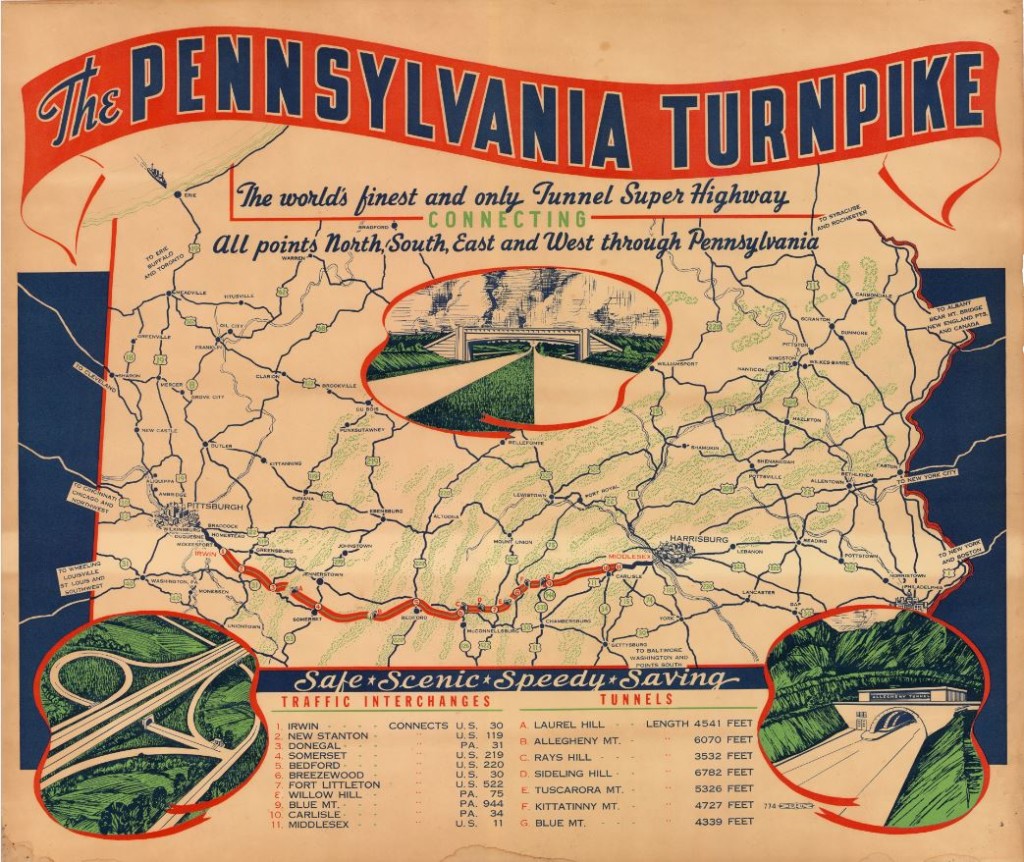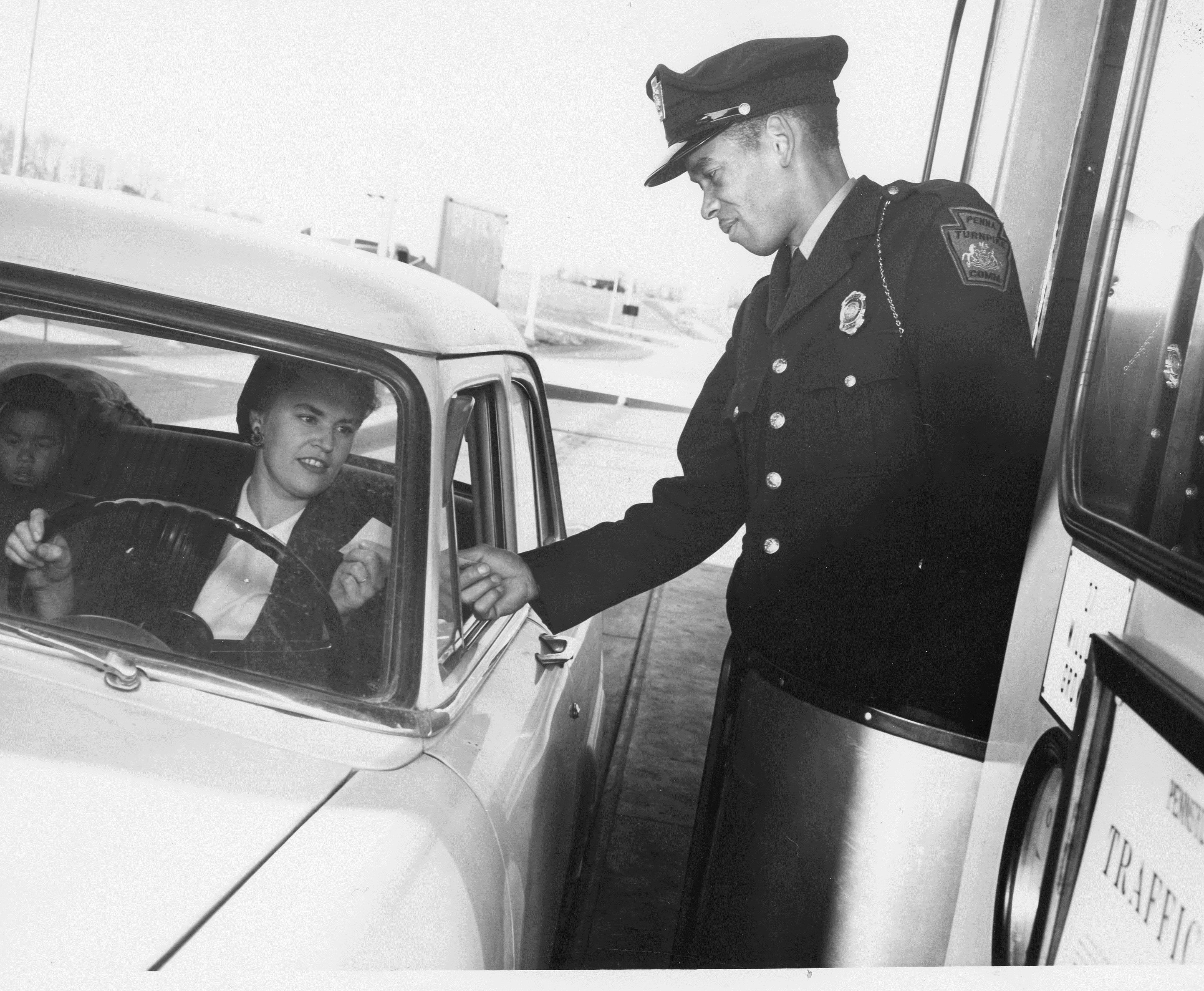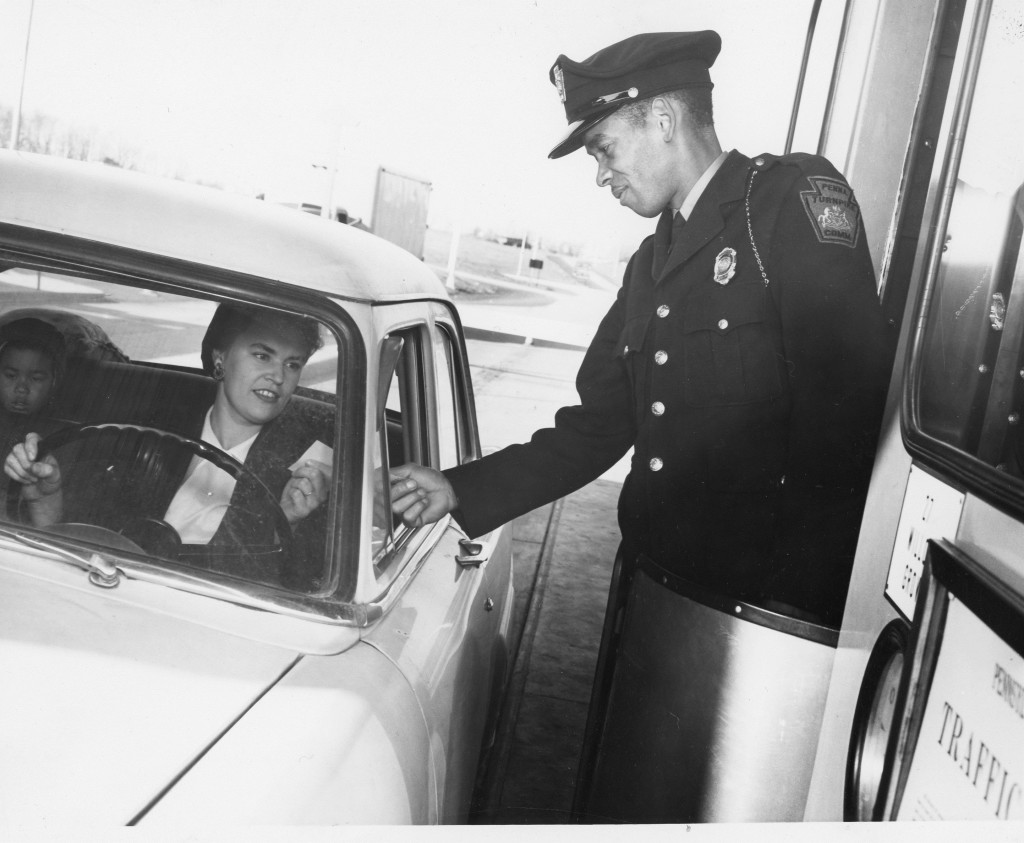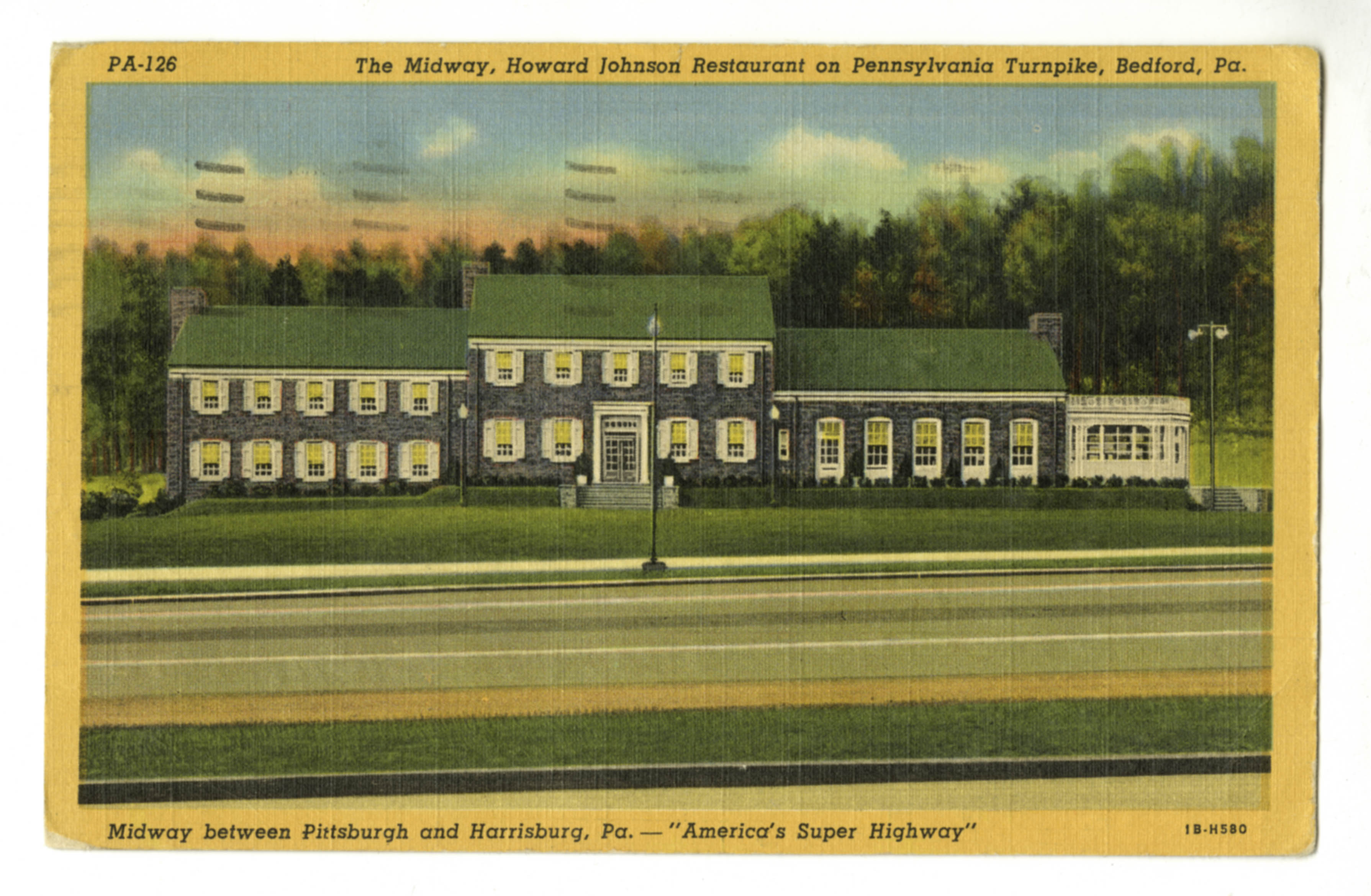 The Pennsylvania Turnpike turned 75 on October 1, and groups throughout the state have already started their tributes to this engineering marvel and cultural icon. On October 2, the State Museum opened a new permanent exhibit about the Turnpike in its Industry and Transportation gallery, and the recent issue of the Pennsylvania Heritage magazine featured a great piece on the Turnpike written by the exhibit’s curator, Curt Miner. Earlier this year, staff from the Pennsylvania Turnpike Commission and PHMC and Gerry Kuncio, senior historian for Skelly and Loy, Inc., gave a presentation about “America’s First Superhighway” at the Statewide Conference on Heritage. We wanted to send out our own birthday greeting and share with our readers some amazing historical facts about our beloved Turnpike.
The Pennsylvania Turnpike turned 75 on October 1, and groups throughout the state have already started their tributes to this engineering marvel and cultural icon. On October 2, the State Museum opened a new permanent exhibit about the Turnpike in its Industry and Transportation gallery, and the recent issue of the Pennsylvania Heritage magazine featured a great piece on the Turnpike written by the exhibit’s curator, Curt Miner. Earlier this year, staff from the Pennsylvania Turnpike Commission and PHMC and Gerry Kuncio, senior historian for Skelly and Loy, Inc., gave a presentation about “America’s First Superhighway” at the Statewide Conference on Heritage. We wanted to send out our own birthday greeting and share with our readers some amazing historical facts about our beloved Turnpike.
So, did you know…?
- The route of the first turnpike segment when it was laid out in the 1930s followed the line of the abandoned South Pennsylvania Railroad Company. In the late 19th century, William Vanderbilt founded the company to connect Harrisburg and Philadelphia and compete with the popular Pennsylvania Railroad, which followed a northerly route through the state. The company made some headway in getting through the challenging Allegheny Mountains, including partially excavating seven tunnels, before Vanderbilt went bankrupt in 1885 and the company folded. They literally set the stage for the Pennsylvania Turnpike engineers 50 years later.
- The Pennsylvania Turnpike Commission (PTC) is 78 years old, and was created when Governor George Earle signed Act 211 to create this quasi-governmental agency to oversee the construction and operation of the revolutionary new road system. Act 211 can trace its origins to Cliff Patterson, a state representative from Washington County, and his 1935 legislation funding a feasibility study for a four-lane tolled highway from Harrisburg to Pittsburgh.
- Using funding from President Franklin D. Roosevelt’s New Deal programs, the Turnpike was designed and built in only 23 months. Over 1,000 engineers churned out plans daily that went right into the hands of the 155 different contracting firms working on the Turnpike, which employed approximately 15,000 laborers to work around the clock. The schedule originally set a June 1940 opening date, but weather events and the unforgiving Western Pennsylvania bedrock delayed the opening until October.
- The Turnpike officially opened for business at midnight on Tuesday, October 1, 1940. Cars full of eager drivers at either end of the 160-mile span stacked up at the Carlisle tollbooth in central Pennsylvania and the Irwin tollbooth in western Pennsylvania and waited for hours to be the first ones on the “dream highway.” Drivers paid about one cent per mile to ride the country’s first high-speed, multiple-lane, limited-access highway; for the first seven months it was open, could also go as fast as they liked with no speed limit. Gas prices averaged about 11 cents a gallon at the time the Turnpike opened.
-
Travelers along the entire route drove through 7 two-lane tunnels (Laurel Hill, Allegheny, Rays Hill, Sideling Hill, Tuscarora, Kittatinny, and Blue Mountain), passed 11 interchanges, and 11 service plazas, many with Howard Johnson’s restaurants and Esso gas stations. One of the original interchange tollbooths will soon be on display at the State Museum for all to appreciate its streamlined, hexagonal design and painted metal construction. The South Midway plaza is the only remaining service plaza that retains most of its original stone façade. It is located along the route at milepost 147.3, and travelers at this stop can also browse Turnpike memorabilia on display inside its renovated interior lobby.
- Approximately 27,000 cars travelled the Turnpike on the first Sunday it was open; by the end of the first year, the road carried over 2.4 million vehicles transporting people, goods, and services across southwestern Pennsylvania, which is double what PTC predicted. The road was hailed as a success for not only cutting the long trip between Pittsburgh and Harrisburg down by three hours but also for its safe, innovative, groundbreaking approach in transportation engineering.
- The Turnpike’s early years were so successful that, by the end of its first decade, the Commission was ready to move onto its next big projects: extending the highway throughout the rest of the state. The first extension, 100 miles from Carlisle to Philadelphia, was complete by 1950, and the second section, 67 miles from Irwin to Ohio, opened in 1951. The extension to New Jersey was completed in two segments in 1954 and 1956. The Northeast Extension, a 110-mile highway from Norristown to Scranton, was the last piece in the overall plan and opened to traffic on November 7, 1957. The Turnpike had become an astounding 470 miles long before its 20th birthday.

This colorful souvenir map highlights the original Turnpike. Image courtesy of Pennsylvania Turnpike Commission.
Just why, some may ask, are we celebrating the Turnpike’s birthday? That is a good question, and the answer isn’t just because it makes all of our lives easier by getting us quickly from Point A to Point B. The Turnpike is significant for the role it played in the development of Pennsylvania’s, and the nation’s, highway system. As the first long distance, limited-access, high speed, uninterrupted highway in the country, the Turnpike changed the way people travelled for work and recreation; almost overnight, a weekday or weekend trip to just about anywhere in southern Pennsylvania between Philadelphia and Pittsburgh was practical and doable.
A few other highways – such as the Garden State Parkway in New Jersey and the Merritt Parkway in Connecticut – shared some design and engineering features with the Turnpike, but no other highway combined all of those elements across such a long distance. It pioneered the concept in this country of the high-speed, long-distance, minimum-grade, limited access highway with integrated service plazas, and was the model promoted for highway design when President Dwight D. Eisenhower signed into law the National Interstate and Defense Highways Act in 1956. While Eisenhower’s legislation effectively ended the further development of toll roads and called for federal dollars to fund an interconnected system of free superhighways, the Turnpike’s legacy remains a story of the success of public-private partnerships and good old Pennsylvania ingenuity.
I can’t do justice to the whole history and significance of the Turnpike in this post, so please visit the State Museum’s new exhibit or go to the PTC’s 75th anniversary website, where you can watch a great video and read some fascinating stories in their archive called “Turnpike Memories.” For more information on the general history of the Pennsylvania Turnpike, visit this page and you’ll be treated to a beautiful rendition of “Pennsylvania Turnpike, I Love You,” a country song written by Penn State alum Vaughn Horton in 1968.
Comment Policy
PHMC welcomes and encourages topic-related comments on this blog. PHMC reserves the right to remove comments that in PHMC’s discretion do not follow participation guidelines.
Commenters and Comments shall be related to the blog post topic and respectful of others who use this site.
Commenters and Comments shall not: use language that is offensive, inflammatory or provocative (this includes, but is not limited to, using profanity, obscene, or vulgar comments); disparage other commenters or people; condone illegal activity; identify the location of known or suspected archeological sites; post personal information in comments such as addresses, phone numbers, e-mail addresses or other contact details, which may relate to you or other individuals; impersonate or falsely claim to represent a person or an organization; make any commercial endorsement or promotion of any product, service or publication.
If you would like to comment on other topics not related to this blog post but related to PHMC, please fill out the PHMC Contact Us Form.

![Ray's Hill tunnel, July 1942, lit up for nighttime driving. Image from the Farm Security Administration/Office of War Information collection at the Library of Congress (LC-USW3- 005707-D [P&P])](https://pahistoricpreservation.com/wp-content/uploads/2015/09/Rays-Hill-Tunnel-1942-LOC-1024x770.jpg)



Quick author’s note! Gerry Kuncio, a senior historian with Skelly and Loy, Inc., prepared a historic context about the turnpike for the Pennsylvania Turnpike Commission, and presented his research along with PTC and PHMC staff during the PA Turnpike history session at the July 2015 preservation conference. My apologies for the oversight, Gerry!
It would be nice to have a list of toll-takers by year. I am doing a family tree and would like that information.
Thanks for a lovely history–classy, like the Turnpike!